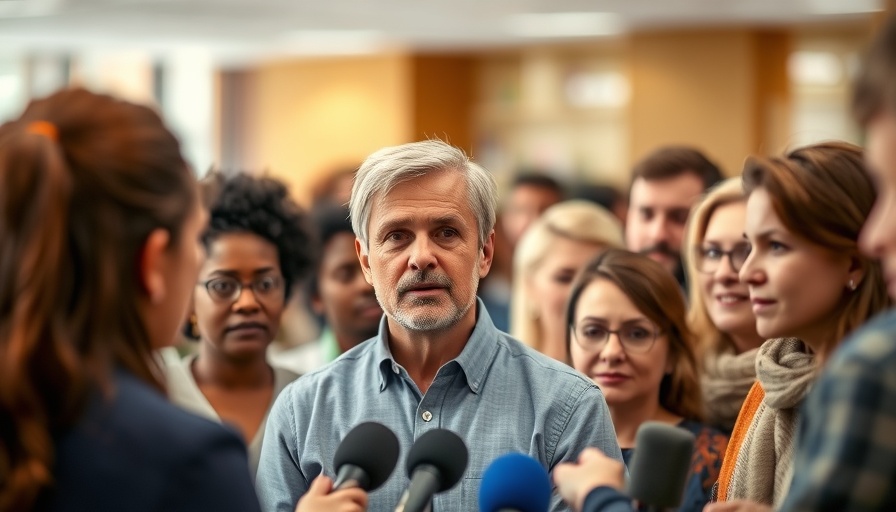
Understanding the Conservative Movement: Student Action Summit in Tampa
This weekend, the Tampa Convention Center buzzes with energy as the annual Student Action Summit, organized by Turning Point USA, is underway. With the expectation of more than 5,000 students from all over the country, this event promotes conservative values, encouraging high school and college students to engage in discussions about their beliefs and ideas. However, it also has attracted significant opposition from local activist groups, illustrating the deeply polarized political landscape that characterizes today's America.
In 'Student Action Summit is underway,' the event explores the convergence of conservative values and political protests, prompting a deeper analysis of its impact.
Protests and Passion: A Point of Contention
The second day of the summit took a dramatic turn as protesters converged on the convention center. As the demonstrators marched with banners proclaiming messages against the spread of what they see as harmful ideologies—ranging from fascism to white supremacy—the atmosphere became charged with fierce debate. Their goal was to ensure that so-called harmful ideas do not take root in Florida or beyond. This confrontation highlights not only the passionate activism present but also the differing perspectives on what constitutes free speech and patriotism in educational spaces across America.
A Glimpse of the Program: Speakers and Workshops
The summit is rich with scheduled events, offering a mix of leadership workshops, networking opportunities, and notable speakers, including Donald Trump Jr. and Tucker Carlson. This blend of professional growth and political insight reflects the organization's mission to empower young conservatives. As attendees participate in various sessions, they are encouraged to explore constitutional values and freedom of speech—a cause they see as under threat. However, it remains to be seen how effectively these sessions will resonate amid the protests just outside.
Community Responses: A Fight for Inclusion
Among the protesters was Oliver Cheese, a student from Florida State University and member of the Tampa Bay Students for a Democratic Society. Cheese expressed concerns that such summits fuel a hostile environment for marginalized groups, particularly amongst Latino and immigrant communities. He noted that these communities feel particularly threatened by the political narratives being championed at the summit. The statements resonate with many who worry about their rights amidst national debates on immigration and deportation.
Finding Common Ground: The Call for Unity
In striking contrast, supporters of the event, like Dino Fanta-Graci, President of the University of Arkansas's Turning Point USA chapter, emphasized the potential for dialogue. He argued for engagement and connection among differing perspectives, suggesting that dialogue is vital in bridging divides. While some attendees clearly aim to rally conservative ideas, others share a yearning for conversation and the hopeful vision for a united campus irrespective of backgrounds—a noble yet challenging endeavor considering the events unfolding around them.
A Broader Reflection: The Implications Beyond the Summit
The events taking place this weekend in Tampa carry echoes beyond the immediate confines of the convention center. They reflect the broader battles over culture and identity taking place across campuses nationwide. As conservatives aim to gain traction and visibility, opponents emphasize the need for inclusive and equitable discussions. These events underscore the essential role educational forums play in shaping political identity and advocacy amongst America’s youth, a critical factor for future engagement as the country heads into election cycles that undoubtedly will influence generations to come.
Future Outlook and Engagement: Opportunities Ahead
As we look towards the conclusion of this summit on Monday, with anticipated panels addressing issues such as U.S.-Israel relations, the question arises: how will the dialogues initiated here influence the future political landscape? Will students take the convictions and insights they’ve gained back to their campuses, further igniting activism and advocacy? The ongoing discussions originating from this event might lead to nationwide conversations about freedom of speech, representation, and the socio-political fabric of American higher education.
As we engage with the complexities of political discussions across America, it becomes vital for individuals—especially students—to seek profound understanding alongside respectful exchanges, understanding that not all opinions will align but that dialogue must continue.
 Add Row
Add Row  Add
Add 






Write A Comment